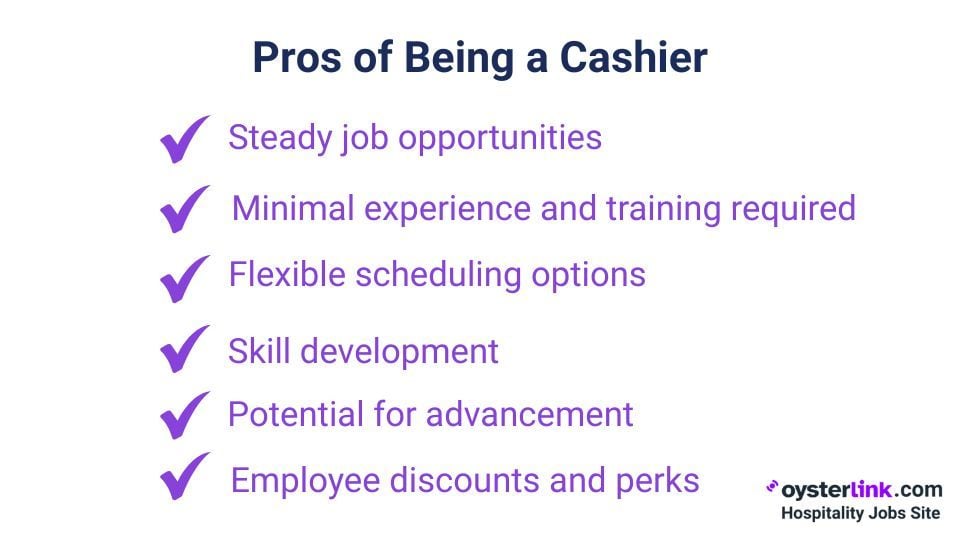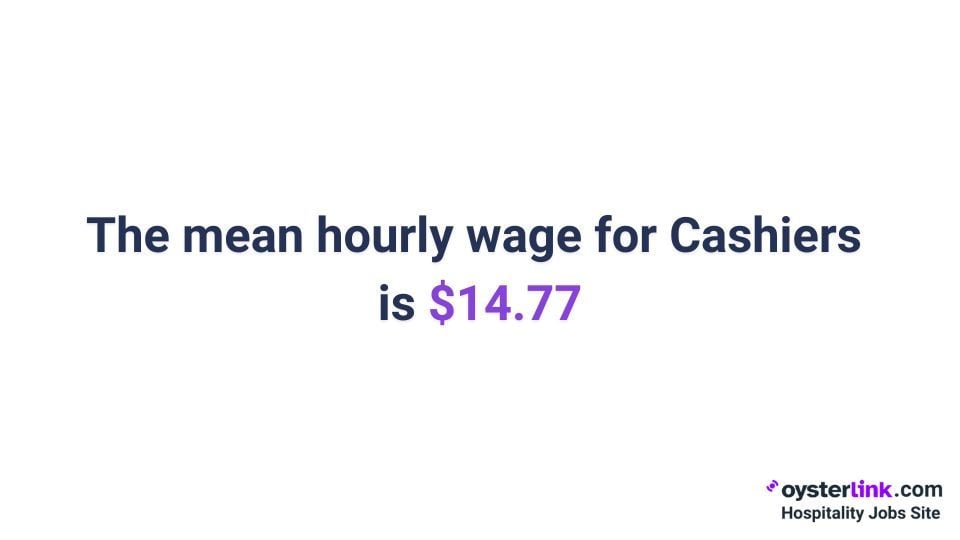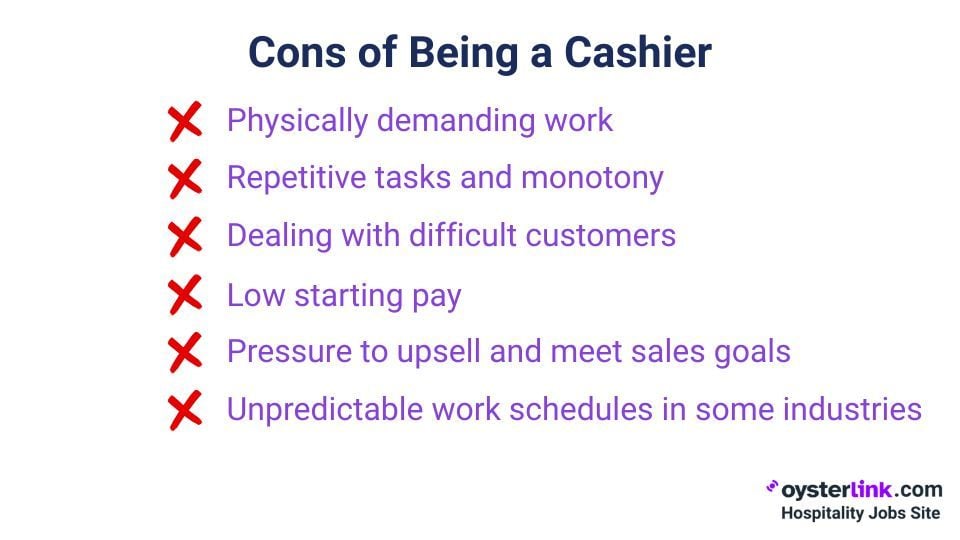A Cashier is responsible for handling customer transactions, processing payments and providing friendly service at checkout.
Whether you’re looking for a flexible part-time job or a stepping stone to a long-term career, understanding the pros and cons of being a Cashier can help you decide if this role is right for you.
Pros of Being a Cashier
Below, we’ll explore the key benefits of working as a Cashier, including job availability, skill-building opportunities and career growth potential.
1. Steady job opportunities
Cashiers are in demand across multiple industries, from supermarkets and convenience stores to fast-food chains and retail outlets.
Because these businesses require checkout staff to operate, finding a Cashier job is often easier than securing roles in other industries. This makes it an ideal option for those looking to enter the workforce quickly.
Additionally, the need for Cashiers remains consistent, as people will always need to purchase groceries, gas and retail products.
While automation has introduced self-checkout kiosks, many stores still rely on human Cashiers to provide personalized customer service and handle transactions efficiently.
2. Minimal experience and training required
Most Cashier positions don’t require prior experience or advanced education. Employers typically provide on-the-job training, covering how to use a point-of-sale system, handle cash and credit transactions and provide excellent customer service.
For those new to the workforce, this makes a Cashier position an accessible way to gain experience, develop valuable workplace skills and establish a strong work ethic.
It’s also a great starting point for individuals who want to build a career in retail, hospitality or customer service.
3. Flexible scheduling options
Cashiers often have flexible work schedules, making it an excellent choice for students, parents and those with other commitments.
Many businesses offer part-time, evening, weekend and holiday shifts, allowing workers to find a schedule that fits their needs.
For those looking to balance school, another job or family responsibilities, this flexibility can be a major advantage. Full-time positions are also available for individuals seeking stable, long-term employment.
4. Skill development
Working as a Cashier helps develop valuable skills such as communication, problem-solving, multitasking and patience.
These abilities are useful in many other career paths, including retail management, sales, hospitality and business administration.
Cashiers frequently interact with customers, which enhances interpersonal skills and teaches conflict resolution strategies.
Learning to handle customer inquiries, complaints and transactions efficiently can prepare employees for higher-level customer service roles or leadership positions in the future.
5. Potential for advancement
Starting as a Cashier can open doors to higher-paying roles in retail and hospitality.
Many companies promote internally, allowing motivated employees to move into roles like Shift Supervisor, Assistant Manager or Store Manager.
Some companies even offer corporate career paths in areas like inventory management, human resources and marketing.
For those interested in advancing, proving reliability, demonstrating leadership skills and gaining experience in other areas of store operations (such as stocking and inventory management) can increase the chances of promotion.
6. Employee discounts and perks
Many retail and restaurant employers offer discounts on store products or meals, which can help employees save money. Some full-time positions also come with benefits such as health insurance, paid time off and retirement plans.
These perks can add significant value to the job, particularly for employees who frequently shop at the store where they work.
Some companies also provide performance-based incentives, bonuses or commission opportunities for Cashiers who meet certain sales goals.

Cons of Being a Cashier
While being a Cashier offers many advantages, there are also some challenges to consider, including repetitive tasks, physical strain and dealing with difficult customers.
1. Physically demanding work
Standing for long hours at a register can be physically exhausting, especially during busy shifts. Some Cashiers also have to lift heavy items, bag groceries and stock shelves, which can contribute to fatigue and muscle strain.
For those working in high-traffic stores, the constant movement and repetitive motions can lead to sore feet, back pain and general discomfort.
Wearing comfortable shoes and taking short breaks when possible can help manage the physical demands of the job.
2. Repetitive tasks and monotony
The daily routine of scanning items, handling payments and repeating scripted greetings can become monotonous over time. For those who enjoy variety in their work, the repetitive nature of being a Cashier may feel dull.
Additionally, working long hours on the same tasks can sometimes lead to boredom or decreased motivation.
Finding ways to stay engaged, such as focusing on customer interactions or setting small personal goals, can help break up the monotony.
3. Dealing with difficult customers
Not all customer interactions are positive. Cashiers frequently encounter impatient, rude or frustrated customers who may complain about long lines, pricing errors or store policies.
Remaining calm, professional and polite in these situations can be stressful, particularly during peak hours.
Learning how to de-escalate conflicts and provide excellent customer service even in difficult situations is an essential skill for Cashiers.
While dealing with challenging customers can be draining, it can also help employees develop patience and resilience.
4. Low starting pay
Many Cashier positions start at or near minimum wage, with pay rates varying by industry and location. The mean hourly wage for Cashiers is $14.77, with the average yearly wage around $30,710.

While some employers offer raises and performance bonuses, wages can remain relatively low compared to other customer service roles, such as bartending or retail sales.
For employees seeking financial growth, looking for employers who provide raises, commissions or promotional opportunities can be beneficial.
Some companies also offer additional compensation through bonuses or profit-sharing programs.
5. Pressure to upsell and meet sales goals
Some stores require Cashiers to upsell products, promote store credit cards or encourage loyalty program sign-ups.
If you’re uncomfortable with sales tactics or dislike pushing products onto customers, this aspect of the job can feel challenging or stressful.
Employees who excel at upselling may receive bonuses or commission incentives, but those who struggle with sales-related tasks may find it frustrating to meet employer expectations.
6. Unpredictable work schedules in some industries
While flexible scheduling can be a benefit, it can also be a downside for those seeking stability.
Many retail and hospitality businesses schedule Cashiers based on fluctuating business needs, which can lead to inconsistent hours, last-minute schedule changes and required weekend or holiday shifts.
Employees looking for a predictable schedule may need to seek full-time roles with set shifts or negotiate availability preferences with their employer.

Industries That Employ Cashiers
Cashiers are found across a wide range of industries, including retail stores, grocery supermarkets, restaurants, cafes, gas stations and convenience stores.
Any business that involves customer transactions relies on Cashiers to ensure smooth operations. In 2024, cashiers held about 3.2 million jobs.
The largest employers of Cashiers were in food and beverage retail (29%), gasoline stations (19%), building material and garden equipment stores (5%) and pharmacies or drug retailers (4%).
Where To Find Cashier Jobs
Looking for cashier positions? Many online platforms list available openings across various industries. OysterLink is especially useful for connecting you with current Cashier roles and streamlining your application process.
Additionally, retail chains, grocery stores and restaurants often post openings directly on their websites or social media pages. Local community boards and career fairs can also be valuable resources in your job search.
Tips for Succeeding as a Cashier
Excelling in a cashier role requires more than just operating a register. By honing certain skills and adopting effective habits, you can stand out and perform your best.
Here are some key tips to help you succeed:
- Develop strong communication skills: Clear and friendly communication with customers can make transactions smoother and leave a positive impression.
- Maintain a professional attitude: A courteous and approachable demeanor helps create a welcoming environment for shoppers.
- Pay attention to details: Accurate handling of payments and change minimizes errors and maintains customer trust.
- Manage your time efficiently: Staying organized during busy hours ensures lines move quickly and customers are satisfied.
- Practice patience with difficult customers: Remaining calm and polite in challenging situations can de-escalate conflicts and enhance your professionalism.
- Stay adaptable: Be willing to assist with additional tasks like stocking shelves or helping team members when needed.
- Keep a positive outlook: A cheerful attitude can improve your interaction with customers and boost your overall performance.
- Stay updated on technology: Familiarize yourself with new point-of-sale systems or digital tools used in your workplace.
- Handle stress gracefully: Maintaining composure during busy or stressful moments is essential for consistent performance.
- Seek feedback and improve: Use constructive criticism as an opportunity to develop your skills and become more efficient.
By following these tips, you can not only succeed in your role as a Cashier but also open doors for future growth and advancement.
Is Being a Cashier Worth It?
The answer depends on your career goals and personal preferences. If you’re looking for a job that offers flexibility, steady employment and valuable customer service experience, working as a Cashier can be a great option.
However, if you prefer a role with higher starting pay, more variety and fewer interactions with difficult customers, you may want to explore other career paths.










Loading comments...